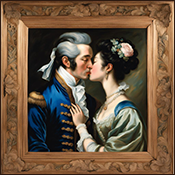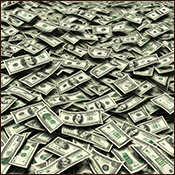Review: “The Gentlemen” starring Theo James and Kaya Scodelario
Many artists have an unmistakeable style. Van Gogh’s brushstrokes are unlike anyone else’s; they may be imitated but never repeated. Hemingway’s prose is clipped and edited to a degree dissimilar to another author’s. No one used cinematic montage like Sergei Eisenstein did.
Similarly, a Guy Ritchie production bears hallmarks of its own. Characters are lurid, as if the contrast settings have been turned up all the way. Violence is sharp, brutal, yet at times almost casual. London is the centre of the universe.
Sometimes this formula works well, others, less so. However, in “The Gentlemen” on Netflix, Ritchie’s formula makes a particularly strong outing.
We begin, perhaps unexpectedly, on the border between Turkey and Syria. Captain Edward Horniman (Theo James), son of the Duke of Halstead, is a UN peacekeeper, checking travellers’ paperwork along with his team. He is clearly efficient, commanding, self-controlled, and possesses a dry sense of humour. A black car pulls up; a solicitor informs the Captain that the Duke is dying. Edward has to return home.
Home is a deeply dysfunctional place; it becomes quickly obvious why Edward might prefer the Turkish-Syrian border to his family’s ancestral pile. His older brother Freddy (Daniel Ings) is unreliable, addicted to cocaine, and thoroughly dissolute. His mother Sabrina (Joely Richardson) is somewhat distant in line with the predilections of the aristocracy. Only the groundskeeper Geoffrey (Vinnie Jones) and his younger sister Charly (Jasmine Blackborow) are obviously reasonable, realistic, and rational.
The Duke (Edward Fox) dies, but unexpectedly names Edward as his heir, much to Freddy’s explosive chagrin. Inheriting the dukedom is a poisoned chalice; Edward discovers that his father has been working with drug dealers in order to keep the family financially afloat. Specifically, the departed Duke allowed a vast indoor marijuana farm to be set up underneath the estate’s dairy. In return, the Duke received an annual consideration from the dealers to the tune of millions of pounds. The criminality does not end there. Worse, Freddy made a poor investment with the financial backing of a group of Liverpool drug dealers, and unless he pays, the gang will kill him.
This is a Guy Ritchie production. Unlike real life, Edward doesn’t even consider calling the police. Rather, he begins a journey into a dark world of intrigue and violence. There is an elegant and sophisticated crystal meth dealer from America, in the form of Stanley Johnston (Giancarlo Eposito, who also played drug kingpin Gus Fring in “Breaking Bad”). The Traveller community has a role to play. There is a small woman who is the UK representative of a Colombian drug cartel; she wields a machete with both skill and vehemence. As someone who once lived in Belgium, I appreciated the addition of a visibly eccentric Walloon gangster named Florian de Groot (literally “Florian the Big”), who rides around on an electric scooter.
Edward wants to extricate his family from this mess; however, Susie Glass (Kaya Scodelario), scion of the drug dealer family that has firmly planted itself on the Duke’s property, works at cross purposes at nearly every turn. Money is the chief lubricant and a corrosive agent: betrayal is a constant. There are few permanent alliances; everyone is climbing over each other to be on top.
It is a wild ride and largely an enjoyable one. There is much to admire: first, the plot always kept me guessing. I couldn’t see the full trajectory of the characters until near the end.
The series could have resorted to a cheap cliche as a plot point, specifically there could have been a romance between Susie and Edward. Despite some hints of romantic potential, love is definitely not in bloom. Susie and Edward are first and foremost business associates. Here, Ms. Scodelario deserves credit: she portrays Susie as a hard-nosed, hard-edged character almost entirely devoid of sentiment. Her eyes are clear, sharply focused, and only very rarely fill with tears.
There is love in this programme, but it is mainly familial. Edward does what he does because he wants to protect his wayward brother and keep the other members of his family out of the fray; personal ambition does not appear until towards the end. Susie loves her foolish boxer brother despite his clear errors. There is an intriguing, Lady Chatterley-esque subplot involving Geoffrey the groundskeeper and Lady Sabrina.
Another strong point: Vinnie Jones was excellent as Geoffrey; he dominates every scene he is in with an air of wisdom and strength. He may very well be the heart of the series. I recall when he transitioned from playing football to acting that there were some doubts. This performance should erase any which remain. He is, above all else, a consummate showman.
There are also substantial political messages embedded in this programme. For example, a statement by one of the criminal characters highlights Edward’s ease of transition into the world of drug dealing. It’s said that the English aristocracy are the “original gangsters”. They had acquired land and still hold it on the basis of what their ancestors could grab. I thought of Balzac’s statement that “Behind every great fortune lies a great crime”. The programme presents a number of landed estates; no doubt at least some were built on slavery, the opium trade, and likely worse.
If the programme has a weakness, it’s that the characters are sometimes too extreme. Edward is so strong he is almost a monolith. He keeps his nerve even after seeing someone hacked to pieces; yes, he is a soldier, but surely that kind of violence would be unfamiliar even to him. Freddy is so dissolute he is beyond all but the most marginal redemption. The dumb are extremely stupid, the stoned can barely string sentences together. Taken too far, this can make some of the lesser players seem unreal.
Another flaw is the near-total absence of the police. If drug gangs were indeed fighting for control of the UK, you would think the authorities would take an interest. There are no visible law enforcement characters.
Nevertheless, these are minor complaints. The run up to Easter is often devoid of entertainment; it’s when toxic candy floss programmes like “Married at First Sight” attract the most listless audiences. “The Gentlemen” wipes away boredom with a shotgun blast. I hope that this is not the last visit we make to the Duke of Halstead’s estate; I suspect it won’t be.











 I'm a Doctor of both Creative Writing and Manufacturing and Mechanical Engineering, a novelist, a technologist, and still an amateur in much else.
I'm a Doctor of both Creative Writing and Manufacturing and Mechanical Engineering, a novelist, a technologist, and still an amateur in much else.




